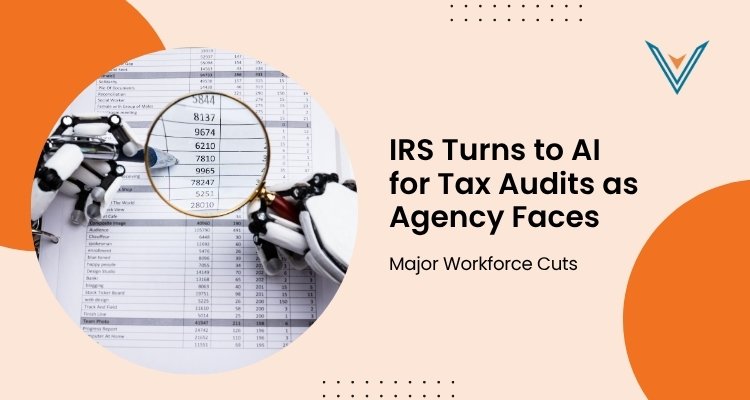Breaking: Government Report Reveals IRS Strategy Shift
The Internal Revenue Service is significantly expanding its use of artificial intelligence to select tax returns for audits, according to a new government report released last week. This strategic shift comes as the agency grapples with widespread layoffs that have eliminated over 11,000 employees since January.
The Treasury Inspector General for Tax Administration (TIGTA) found that the IRS can better leverage AI technology to improve its audit selection process. The move represents a major change in how America’s tax agency operates.
Current Audit System Wastes Resources, Report Finds
The Problem with Traditional Methods
A troubling pattern has emerged in IRS audit practices. The agency’s current tax return selection models result in a high percentage of examinations that conclude with no changes to taxpayers’ liability, according to TIGTA’s findings.
This means the IRS is wasting valuable resources on unproductive examinations while unnecessarily burdening compliant taxpayers with audits. The report suggests AI models can dramatically improve how the agency selects cases for examination.
AI Shows Promise for Better Results
The IRS began implementing AI technology several years ago, moving away from relying primarily on past audit results. Instead, the agency now uses AI models trained on current tax return data to identify potential issues.
TIGTA’s assessment focused on how effectively the IRS’s Large Business and International Division and Small Business/Self-Employed Division use AI models to identify returns and issues for examination.
Government Watchdog Makes Key Recommendations
Using Historical Data More Effectively
The report recommends that the IRS better utilize historical examination results to monitor and improve its AI models. Officials could use past audit outcomes to enhance return classification and selection of AI models, potentially identifying new areas of noncompliance.
Advanced Machine Learning Techniques
TIGTA suggests the IRS should evaluate “ensemble machine-learning” to improve accuracy in identifying noncompliant taxpayers and narrowing the tax gap. This approach combines multiple machine-learning algorithms to make more accurate predictions about which tax returns warrant examination.
Accountability Measures Missing
A significant concern emerged from the investigation: the IRS has not established processes to evaluate whether AI models perform better than previous methods or achieve intended objectives. This lack of evaluation contradicts federal AI best practices for ensuring accountability and responsible use.
Massive Workforce Reduction Impacts Operations
Staggering Job Losses Hit Revenue Agents Hard
The numbers paint a stark picture of the IRS’s current situation. More than 11,400 employees have either received termination notices or voluntarily resigned, representing an 11% reduction in the agency’s workforce.
The cuts disproportionately affected revenue agents who handle audits and examinations. Approximately 31% of revenue agents—totaling 3,623 people—left the IRS under the reduction program.
Additional Departures Expected
Anne Gibson, a senior legal analyst at Wolters Kluwer, reported that about 11,000 employees have been let go since Inauguration Day. More concerning, over 20,000 IRS employees have accepted a second deferred resignation offer.
Reports indicate the administration’s goal is to eventually reduce the IRS workforce to 50-60% of January 2025 levels, leaving only 50,000 to 60,000 total employees.
Service Disruptions Already Visible
Immediate Impact on Taxpayers
The workforce reduction is already affecting taxpayer services:
- Phone Service Delays: Increased wait times on IRS telephone lines
- Refund Processing Concerns: Questions about how quickly tax refunds will be issued
- Cancelled Audits: Many ongoing audits have been dropped mid-process
Long-term Operational Challenges
Gibson noted that audits already in progress or close to completion are being cancelled because audit team members were laid off and the agency lacks staff to continue the work.
“I imagine we’ll see more of that,” Gibson said. “With those reductions, I think we’ll probably see fewer audits going forward than we would have otherwise seen.”
IRS Responds to Recommendations
Agency Accepts Changes
The IRS agreed with all three TIGTA recommendations, though officials noted implementation depends on staffing constraints and anticipated Treasury Department guidance on AI governance.
Reza Rashidi, acting chief data and analytics officer, stated the IRS has already tested and implemented ensemble methods in AI models where appropriate.
Commitment to Improvement
“The IRS is committed to continuously improving the case selection process,” Rashidi wrote in response. “This includes making use of well-established processes to evaluate model
performance.”
The agency is currently awaiting new Treasury Department guidance regarding AI governance policies and priorities.
Historical Context Adds Urgency
Years of Understaffing Concerns
Tax professionals have long argued that the IRS has been understaffed and underfunded for the past decade. While the Inflation Reduction Act allowed for some additional hiring, most experts felt staffing levels remained inadequate.
The current reductions represent a significant step backward from already insufficient staffing levels, making operations across all IRS areas more difficult and time-consuming.
What This Means for Taxpayers and Tax Professionals
Compliance Becomes More Critical
With AI becoming more sophisticated at detecting discrepancies, accurate record-keeping and proper tax compliance are increasingly important. Technology may catch issues that previously went unnoticed.
Professional Guidance More Valuable
As the IRS modernizes its audit selection process while reducing human oversight, professional tax preparation and advisory services become more crucial for taxpayers seeking to minimize audit risk.
Planning Ahead Essential
The changing landscape makes proactive tax planning and professional guidance more important than ever for both individuals and businesses.
Virtue CPAs Expert Analysis
Our Professional Perspective
“These developments represent a fundamental shift in how the IRS operates,” says the team at Virtue CPAs, a leading accounting firm serving clients across the United States from their Alpharetta, Georgia headquarters.
“While AI can make audit selection more efficient, the reduction in human oversight creates both opportunities and risks for taxpayers,” the firm notes.
Recommendations for Clients
Maintain Impeccable Records with AI systems becoming more sophisticated at pattern recognition, Virtue CPAs emphasizes the importance of:
- Keeping detailed, accurate financial records
- Documenting all income sources thoroughly
- Maintaining proper substantiation for all deductions
- Filing returns accurately and on time
Proactive Tax Planning The firm recommends clients take a more strategic approach to tax planning:
- Regular review of tax positions throughout the year
- Strategic timing of income and deductions
- Proper entity structure planning for businesses
- Stay ahead of changing regulations and AI detection capabilities
Professional Partnership “As the IRS leverages technology while reducing staff, having experienced professionals on your side becomes even more valuable,” Virtue CPAs advises. “We help clients navigate these changes while ensuring full compliance and optimal tax outcomes.”



